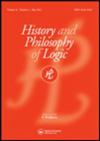布兰切特的“绿色后果”概念的形式解释
IF 0.5
3区 哲学
Q3 HISTORY & PHILOSOPHY OF SCIENCE
引用次数: 0
摘要
在过去的几十年里,Patricia Blanchette对Frege的逻辑概念和他对逻辑结果的看法进行了深入的阐述。她的解释的核心组成部分之一是弗雷格的逻辑后果概念是“语义丰富的”,而不是纯粹的形式。本文的目的是对这一点以及为她的叙述提供信息的相关思想进行精确的解释,并讨论它们对一般逻辑哲学,特别是弗雷格哲学的意义。本文章由计算机程序翻译,如有差异,请以英文原文为准。
A Formal Explication of Blanchette's Conception of Fregean Consequence
Over the past decades, Patricia Blanchette has developed a sophisticated account of Frege's conception of logic and his views on logical consequence. One of the central components of her interpretation is the idea that Frege's conception of logical consequence is ‘semantically laden’ and not purely formal. The aim of the present paper is to provide precise explications of this as well as related ideas that inform her account, and to discuss their significance for the philosophy of logic in general and Frege's philosophy in particular.
求助全文
通过发布文献求助,成功后即可免费获取论文全文。
去求助
来源期刊

History and Philosophy of Logic
综合性期刊-科学史与科学哲学
CiteScore
0.80
自引率
0.00%
发文量
24
审稿时长
>12 weeks
期刊介绍:
History and Philosophy of Logic contains articles, notes and book reviews dealing with the history and philosophy of logic. ’Logic’ is understood to be any volume of knowledge which was regarded as logic at the time in question. ’History’ refers back to ancient times and also to work in this century; however, the Editor will not accept articles, including review articles, on very recent work on a topic. ’Philosophy’ refers to broad and general questions: specialist articles which are now classed as ’philosophical logic’ will not be published.
The Editor will consider articles on the relationship between logic and other branches of knowledge, but the component of logic must be substantial. Topics with no temporal specification are to be interpreted both historically and philosophically. Each topic includes its own metalogic where appropriate.
 求助内容:
求助内容: 应助结果提醒方式:
应助结果提醒方式:


